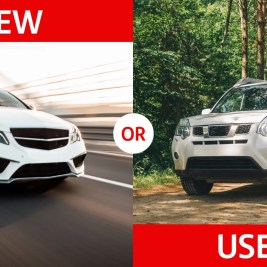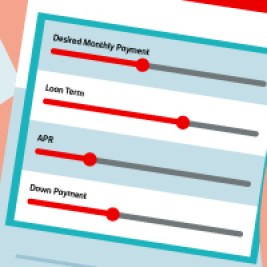
It should be no surprise.
What you need to know about credit when financing a vehicle is that lenders generally provide more financing to borrowers with higher credit scores.
Almost half the money loaned goes to so-called super-prime borrowers – those with credit scores of 720 or above – based on data from the Consumer Financial Protection Bureau (CFPB) website. And more than 40 percent of the rest goes to borrowers with prime scores, between 660 and 719.
That means borrowers with scores below 660 are chasing less than one-third of the total available funds for their vehicle purchases – and are likely to pay more for the privilege.
Knowing your credit score and details of your credit report before shopping for a vehicle will help you see how lenders view you relative to other borrowers, including how you manage your financial responsibilities and debt associated with your credit score.
How you’re scored
Your credit score may not be the only factor to determine whether you receive a loan, how much financing you receive and what interest rate you pay. Santander Consumer USA (SC), for example, uses a credit score plus other sources to determine financing.
But your score should help you have realistic expectations when you apply for credit.
“FICO scores are calculated from many different pieces of credit data in your credit report … both positive and negative information,” according to Fair Isaac Corporation (FICO), which calculates the scores. “Late payments will lower your FICO Scores, but establishing or re-establishing a good track record of making payments on time will raise your score.”
Generally, the scores are based on the following factors: payment history (35 percent), amounts owed (30 percent), length of credit history (15 percent), new credit and credit mix (10 percent each).
The importance of these five categories varies by person seeking financing.
The long and short of it
“For example, people who have not been using credit long will be factored differently than those with a longer credit history … The importance of any one factor in your credit score calculation depends on the overall information in your credit report,” Fair Isaac says on its website. “In addition, as the information in your credit report changes, so does the importance of any factor in determining your FICO scores.”
FICO explains that “it’s impossible to measure the exact impact of a single factor in how your credit score is calculated without looking at your entire report.”
All of this underscores the importance of checking your credit reports from the three major credit bureaus – TransUnion, Equifax and Experian – at least annually so you can request corrections if any information they contain is incorrect or has changed significantly, and to see where you may need to improve your credit performance before you seek financing.
Get your credit report

Getting your credit reports from the major bureaus puts you in a position to set reasonable expectations when you apply for financing on a vehicle.
And to take advantage of the opportunity to positively influence your credit score.
Generally, the higher your credit score, which is based on your credit reports, the more likely it is that you can get vehicle financing – and how much, how long, and how high (interest rate) – based on information at the CFPB website.
But once you have gotten financing, making regular, on-time payments will help you “fix a credit score and maintain good credit,” says FICO, which uses credit reports from the three major bureaus – Experian, Equifax and TransUnion – to compile scores.
What’s in your report
When you get your credit reports, here’s what you should see, according to FICO:
Identifying information, including your name, address, Social Security number, date of birth and employment information, with updates coming from information you supply to lenders.
Trade lines – your credit accounts – based on information that lenders report to the credit bureaus.
Credit inquiries you authorized a lender to request when you applied for a loan. The inquiries section contains a list of everyone who accessed your credit report within the last two years.
Public record and collections from state and county courts, including bankruptcies, foreclosures, suits, wage attachments, liens and judgments, and information on overdue debt from collection agencies.
You can get free copies of all three reports every 12 months from AnnualCreditReport.com. Websites such as CreditKarma.com, CreditSesame.com, Credit.com and WalletHub.com offer free credit scores.
Once you have your report, check it for any errors – incorrect late payments, amounts owed, etc. – and dispute with the credit bureaus anything that doesn’t look right.
Set a payment reminder
Knowing your credit score and details of your credit report before shopping for a vehicle will help you see how lenders view you relative to other borrowers, including how you manage your financial responsibilities and debt associated with your credit score.
Besides checking your reports for errors, which would be reflected in your credit score, FICO suggests setting up payment reminders to keep you on track.
“Some banks offer payment reminders … that can send you an email or text message reminding you when a payment is due. You could also consider enrolling in automatic payments through your credit card and loan providers to have payments automatically debited from your bank account.”
SC provides multiple free options to keep up to date on your monthly payments, including Auto Pay, which automatically deducts funds from a personal account and credits to your SC account.
Why pay on time
“Delinquent payments, even if only a few days late, and collections can have a major negative impact on your [credit] scores,” says Fair Isaac in How to repair credit and improve my FICO Scores on its website. “The longer you pay your bills on time … the more your FICO scores should increase.”
“If you have missed payments, get current and stay current,” FICO advises.
“Consumer behavior strongly influences credit scores, especially whether payments are made on time, and it’s easier to lower than to raise scores,” says the Consumer Federation of America.
Santander Consumer, which uses FICO scores plus other sources to make vehicle financing decisions, submits information to the three credit bureaus at the end of each month. The credit bureaus have 30 days from the receipt of that information to update your report.
Realistic expectations

Do you have excellent credit?
Then you probably won’t have much trouble getting the financing you need to purchase your next vehicle as long as you’re not buying beyond your means.
But not having excellent credit won’t necessarily keep you from the car you need or want, either.
Although your credit score may not be the only factor to determine whether you receive a loan, how much financing you receive and what interest rate you pay, your score should help you have realistic expectations when you apply for credit, whether it is with Santander or anyone else.
For example, a super-prime borrower (781-850) purchasing a $20,000 used vehicle with a $4,000 down payment resulted in an average interest rate of 4.29 percent and total interest of about $1,440 over a 48-month term, based on nerdwallet.com’s car payment calculator.
Cost of lower scores
The average interest for a nonprime borrower (601-660) purchasing the same vehicle would be about 11.26 percent and total interest of nearly $4,000, based on the calculator.
And borrowers with lower credit scores could expect to pay higher rates and more total interest.
Of course, ultimately, improving your credit score can make a big difference in interest rate and total interest payments such as those in the examples above. A borrower bumping his/her credit from nonprime to prime (661-780) could see savings up to $1,700 on interest payments, the calculator shows. Improving from subprime (501-600) to nonprime could result in savings of up to $2,300.
But that kind of improvement in your credit score could take a while that you may not have.
‘Like losing weight’
“Repairing bad credit is a bit like losing weight,” according to the FICO website. “It takes time, and there is no quick way to fix a credit score. In fact, out of all the ways to improve a credit score, quick-fix efforts are the most likely to backfire, so beware of any advice that claims to improve your credit score fast.”
“The best advice for rebuilding credit it to manage it responsibly over time,” the website says.
Your score can change each time a lender reports your information to the credit bureaus, including making your monthly car payment on time, says bankrate.com.
“If you are very close to moving from one score range to another, these monthly changes can help.”
A lender such as SC has years of experience providing borrowers who don’t have perfect credit an opportunity to establish a record of on-time monthly payments, funding loans through around 14,000 vehicle dealerships and directly through Chrysler Capital.
Regardless of the lender that finances your vehicle purchase, however, the same basic rules apply.
Make regular payments

Making regular payments is what all lenders such as Santander Consumer and other creditors expect from borrowers to keep their accounts current.
“Payments are required to be made by the due date listed in your contract,” says the auto lender. “Interest charges will accrue on the past-due amount and be applied to your account each day, which increases the total amount you pay on your contract.”
So, waiting to tell your lender if you expect to miss a car payment is not a good idea.
“Delinquent payments, even if only a few days late, and collections can have a major negative impact on your [credit] scores,” says Fair Isaac on its website.
That being said, SC also understands that life can catch up with even the best-intentioned customer.
When bad things happen
“If you believe you cannot make your payment on time, please contact an account manager right away,” advises Santander Consumer, which services more than three million customers.
“We’ll work with our customers to keep them on track, because we know that the vehicles they financed with us are an important part of their lives, how they get to work, how they get to the supermarket, how they drive their families,” said an SC account manager.
“I can help you out. You tell me what you can do. And, then, within my parameter, I’m going to help you the best I can,” said a recovery specialist. “We’ve got to see what their situation is. What are your plans? What’s going on? What is your ultimate goal at this point?
“I always put myself in the customer’s shoes, because a lot of our customers, something has happened. Especially when we have customers who have a perfect history … I empathize with them.”
Contact your lender
But you don’t have to know someone to get customer service or an account manager to talk to you. Don’t wait. Don’t be late. Don’t skip a payment. Contact us instead:
- Customer service representatives are available by phone 888.222.4227 from 7 a.m. to 9 p.m. Central Time Monday through Friday and 7 a.m. to 5 p.m. Saturday.
- Customers also can reach us through live chat after logging in to MyAccount or via social media private messaging on Facebook and Twitter from 8 a.m. to 5 p.m. Monday through Friday.
“I’m very proud to do what I do. It just gives me a sense that I’m helping someone,” said the recovery specialist. “What I want my customers to think about is that once they get back on their feet and everything is better, when they need a new vehicle, they think of Santander.”



